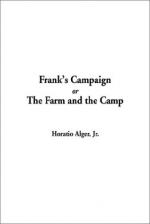“Mr. Morton,” said Frank, as they walked leisurely home, “did you notice how Squire Haynes stared at you this morning?”
Mr. Morton looked interested. “Did he?” he asked. “I did not notice.”
“Yes, he turned halfround, and looked at you with a puzzled expression, as if he thought he had seen you somewhere before, but could not recall who you were.”
“Perhaps I reminded him of some one he has known in past years,” said the young man quietly. “We sometimes find strange resemblances in utter strangers.”
“I think he must have felt quite interested,” pursued Frank, “for he stopped me after church, and inquired who you were.”
“Indeed!” said Henry Morton quietly. “And what did you tell him?”
“I told him your name, and mentioned that you were boarding with us.”
“What then? Did he make any further inquiries?”
“He asked where you came from.”
“He seemed quite curious about me. I ought to feel flattered. And what did you reply?”
“I told him I did not know—that I only knew that part of your life had been passed in Europe. I heard him say under his breath, ‘It is singular.’ "
“Frank,” said Mr. Morton, after a moment’s thought, “I wish to have Squire Haynes learn as little of me as possible. If, therefore, he should ask you how I am employed, you say that I have come here for the benefit of my health. This is one of my motives, though not the principal one.”
“I will remember,” said Frank. “I don’t think he will say much to me, however. He has a grudge against father, and his son does not like me. I am sorry that father is compelled to have some business relations with the squire.”
“Indeed!”
“Yes, he holds a mortgage on our farm for eight hundred dollars. It was originally more, but it has been reduced to this. He will have the right to foreclose on the first of July.”
“Shall you have the money ready for him at that time?”
“No; we may have half enough, perhaps. I am sometimes troubled when I think of it. Father feels confident, however, that the squire will not be hard upon us, but will renew the mortgage.”
Henry Morton looked very thoughtful, but said nothing.
They had now reached the farmhouse.
Dinner was already on the table. In the center, on a large dish, was the turkey, done to a turn. It was flanked by the chickens on a smaller dish. These were supported by various vegetables, such as the season supplied. A dish of cranberry sauce stood at one end of the table, and at the opposite end a dish of apple sauce.
“Do you think you can carve the turkey, Mr. Morton?” asked Mrs. Frost.
“I will at least make the attempt.”
“I want the wish-bone, Mr. Morton,” said Maggie.
“No, I want it,” said Charlie.
“You shall both have one,” said the mother. “Luckily each of the chickens is provided with one.”




